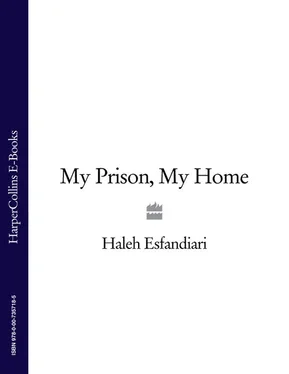Affairs between Mossadegh and the shah, and Mossadegh and the British, came to a head in August 1953. Early that year, the British government succeeded in persuading the incoming Eisenhower administration to join their plan to overthrow Mossadegh. The CIA and Britain’s Secret Intelligence Service (SIS) went to work. A reluctant shah was brought on board. Royalist officers in the army were won over; newspaper editors, members of parliament, and politicians were paid off; the cooperation of political operators who could mobilize the street crowds was secured.
The plot was set in motion in August, and after two days of seesaw battles on the streets, the royalist forces finally prevailed. The shah, who had left the country for Rome when the plot initially appeared to have failed, returned to Iran to reclaim his throne. During that turbulent week, I happened to have gone with my parents to the Caspian city of Rasht. We arrived at the very height of the crisis and saw the statue of the shah, which had dominated the main city square, lying on the ground, smashed to pieces. It had been pulled down from its pedestal by anti-royalist crowds. A few days later, after royalist forces had prevailed, someone had put the broken-off head of the shah’s statue back on its pedestal. There was the shah, albeit somewhat reduced in stature, gazing across the square again.
These momentous national events left the family with mixed feelings. They were devastated to see Mossadegh’s home ransacked, and the prime minister put on trial and jailed. But they were relieved that the threat of upheaval had been averted, and that Mossadegh’s immediate family had not been harassed. When we gathered in Arak during the summer of the following year, all talk of politics had come to an end and, at least to a child, life had returned to its normal, lazy rhythm.
I WOULD NOT COME INTO contact with such fierce political loyalties again until I attended university—in Vienna, at my mother’s insistence—five years later. Many of my fellow Iranian students were active in the opposition movement against the shah. The principal student organization, the Confederation of Iranian Students, was left of center rather than revolutionary, dedicated to the memory of Mossadegh and loyal to his political party, the National Front. But more radical currents, some Marxist, some Islamic, were already stirring among the students, and two decades of authoritarian rule in Iran would turn a future generation of students into outright revolutionaries.
While I stayed clear of the student movement (my father having instilled in me both patriotism and caution about getting mixed up in politics), my time in Vienna had a huge hand in shaping my intellectual development and my love for Western culture. I studied journalism, philosophy, and art history, but I also attended poetry readings and literary debates. I heard Sviatoslav Richter play the piano and Yehudi Menuhin play the violin; I even heard a young and yet unknown Zubin Mehta conducting a student orchestra. I spent a summer in London improving my English, and traveled to East Berlin, Munich, Rome, Venice, Paris, and Geneva. Even if I wasn’t fully conscious of it at the time, it was during these years that I came to appreciate the value of freedom of thought and expression, the right to travel and explore, and freedom from authoritarianism.
I returned to Tehran in the summer of 1964 and was hired by the publisher of Kayhan , the largest daily newspaper in the country. Since I knew French, English, and German as well as Persian, I was assigned to the foreign news desk. When the publisher, Dr. Mostafa Mesbahzadeh, known to everyone as “Doktor,” introduced me to my colleagues on the foreign news desk, I was met with skeptical stares. The foreign news veterans were all men in their early fifties, educated, but from modest backgrounds. Most of them, I later learned, were former Communists or had dabbled in left-wing ideologies popular among students and the new educated middle class in the postwar period. They had spent time in prison after the overthrow of Mossadegh, and some of them had been tortured. Times had changed, but they remained attached to their radical political beliefs.
I was twenty-four, the only woman on the foreign news desk, one of the very few in the entire newsroom. I was also from the wrong social class in their eyes, with a well-known family name and family members in senior positions in the civil service. These “enlightened radicals” clearly did not think a woman capable of doing their weighty work, and they were not comfortable having a woman in their midst. “Does this zaifeh —this weak one—understand anything?” an older reporter once sneered, using a traditional and derogatory term for women. With me around, the men had to watch their language and stop exchanging crude jokes and accounts of their escapades. The toilet in the building was for men only, meaning I simply could not go to the bathroom all day. At five-thirty in the morning, my colleagues would breakfast on a dish of sheep’s brains and sheep’s feet—a delicacy in Iran, but one whose sight and smell nauseated me. One or two of the men even topped off their breakfast with a glass of vodka. But my foreign language and translating skills were good, I was speedy, and gradually the men came to accept me. For a brief period, I even became the foreign news editor, and by the end of my decade at the paper, the environment had changed so dramatically that women were even given their own bathroom.
Kayhan was an afternoon paper, and except for major stories, the foreign news pages were put to bed relatively early. I arrived at work at five-thirty in the morning and worked until two-thirty in the afternoon. Depending on the volume of news, I sometimes stayed through the afternoons and evenings, as well.
The newspaper had no foreign correspondents of its own and relied on the wire agencies Reuters, the Associated Press, United Press International, and Agence France-Presse. We were still in the age of teleprinters, and dispatches came rattling through on long perforated sheets of paper. Every half hour someone would walk in with rolls of dispatches and give them to the translators. At noon, the mail boy would bring in newspapers flown in from Europe—the Herald Tribune, The Times of London, the Financial Times, Le Monde, Figaro. In August 1968, when Russian tanks invaded Czechoslovakia, I remember huddling around the teleprinters as the dispatches rolled off the machines. Earlier that year, the new Czech leader, Alexander Dubček, had sought to loosen the hold of Soviet-style communism over the country. He had freed up the press, allowed non-Communist political parties to operate, and decentralized the economy. The “Prague Spring” seemed, for a moment, to herald a wave of change across the Soviet bloc. But what the Czechs welcomed the Russians feared, and that morning the news coming across the teleprinters was grim. More than 200,000 Soviet and Warsaw Pact troops had fanned across the country. Dubček and his colleagues as well as Czech activists and intellectuals had been arrested. The Prague Spring was being snuffed out. Even my leftist colleagues were hard put to justify the invasion.
The staff of the foreign news desk served principally as translators. The editor selected the stories he wanted to run, and we translated them in longhand. They were then typed and edited, headlines were written, and the type was set.
Just before the presses rolled at noon, the censor from the government’s information office would show up with a list of stories that we were not allowed to run. The censor, Mahram Ali Khan, had held the job since the 1930s, and each day he went from newspaper office to newspaper office with the censor’s list. He checked all the pages and read all the major stories. Sometimes he ordered the removal of a name or a paragraph, sometimes a whole story. We were not allowed, for example, to report student demonstrations in other countries, lest our own university students get ideas. We were not allowed to repeat criticism of the shah from abroad. Fortunately, Mahram Ali Khan had a sense of humor. One day, before I joined Kayhan , the journalists took advantage of Mahram Ali Khan’s visit to the men’s room, locked him in, and pretended they could not open the door. They quietly reinserted the stories he had removed and went to press before they let him out.
Читать дальше












